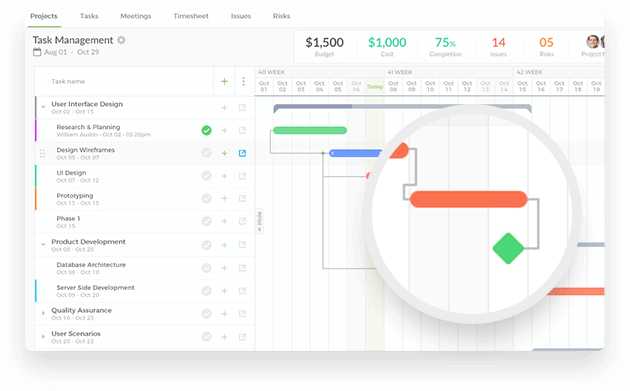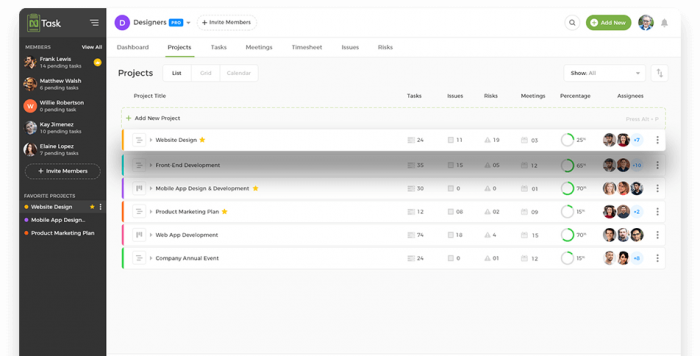Every project manager needs a sense of direction and inspiration to move along. Usually, it comes in the form of mentorship, project management tips, books, and learning material. For this write-up, we will emphasize project management tips as they are easy-to-learn from.
Project Management Tips Are Not That Easy to Implement | Here’s Why…
Below we will outline two main project management tips that will help you to take your projects to the next level.
Project Management Phases

However, before we get into the project management tips to achieve more; it would be beneficial to look into the varying project management phases. This will allow you to easily implement the actual tips in due course of time.
1. Project Initiation
The first stage of the project lifecycle is initiation. The project is evaluated and the project manager decides whether pursuing a particular project will be beneficial.
2. Project planning
Once it is decided that the project will be feasible to pursue, planning goes underway. The plan must include details about the resources, finances, and procuring required materials.
The project plan gives a detailed overview of how to go about the project and possible obstacles that may be faced. It prepares the team by informing them of the scope, costs, and timeframe of the entire project.
3. Project execution
Dependent on how well the project has been planned in the first place, execution can be made very easy. The aim is to build deliverables to satisfy the customer.
4. Project monitoring and control
Usually, as the team executes the project, they are required to simultaneously monitor the progress.
It is essential to ensure that the end product of the project is what the customer sought. To be able to deliver this, the team must monitor tasks as they complete them.
5. Project closure
Once the team delivers the project to the customer, the project is closed. Teams also need to communicate this fact to stakeholders.
Once the project is completed and documented, the team can now move on to acquiring a new project to begin. When starting a new project, teams must keep in consideration the mistakes and successes that helped them complete any previous projects.
Now we have gone over the steps you need to take to undergo any project let’s look into some tips that you can implement to ensure you get more done as a project manager and make the whole process more beneficial for your outcome.
Flag These Two Project Management Tips to Gain a Headstart Over Competitors
1. Prepare a thorough, actionable plan for your project

Before you start any project, it is necessary to make a plan. This plan needs to be detailed and easily followable to ensure that the whole project runs smoothly. It also will ensure that deadlines are met.
There are different tools you could use to create the greatest project plan for you, but however you go about creating the plan, ensure that each plan includes the following details.
Include these in your project plan:
i). Scope
In your plan ensure you identify the scope of the project.
Scope creep is a term all project managers are wary of. It is a term referred to how, over the span of a project, the project’s requirements manage to increase.
Scope creep tends to disrupt your entire project layout and strategy. As they can require anything from additional resources to time and costs.
Therefore, before you start with any project make sure your plan is detailed. And make sure you lay out the scope of your project point-blank.
Moreover, guarantee you are aware and have clearly outlined what falls within the scope of your project. It will also be beneficial to think up how you will deal with things that come up that are out of scope.
ii). Responsibilities
It will be fruitful to identify in your plan each team member’s responsibilities.
Make sure that every team member is aware of what they are expected to do, but also have all the information they need about the project so that they can get their work done without delays.
Having responsibilities laid out from the start helps establish timelines as well as costs but also ensures there is no disruption between the teams to create delays.
Project plans should be vertical. As different members of your team will be working on different tasks to complete the project all at once. Thus, it helps to outline each team member’s responsibilities from the start.
iii). Goals and milestones

Try and break your project down into small milestones, these measurable goals will help you determine how much progress your team has made.
Furthermore, make sure the goals you mention are actionable and measurable. You need to make sure you have outlined goals that you can easily measure and determine whether they have been met or not.
Include feedback from your team and stakeholders to build your goals and milestones. And make sure you have feedback on how these goals have been met. This will not only help you in determining the progress of your current project but can also be used for future projects as learning tools.

-
nTask is the Best Project Management Software
Manage tasks, teams, projects, milestones, and goals with nTask. Join Now!.
- Get Started for Free
iv). Budgets
Although deciding a budget is important, make sure your plan is not based on how much budget you have allocated but rather on what your goals are.
Your budget needs to be proportionate to the project at hand. It is illogical to allocate a tiny budget out of proportion to the work you will be required to do. This will result in your project failing from the get-go.
Budgeting along with goals is a good track of the progress of your project. Get more information about creating the perfect budget for your project here.
v). Evaluation
As a big part of the whole project process, evaluation should also be indicated in any plan you create.
You need to identify what you will analyze and evaluate when your project is in completion to know that you have finished a successful project.
Highlight the quality, deliverables, and performance as your checkpoints. They will most likely save your hide in tough times!
Moving on, as mentioned earlier, evaluation is not the only success key to the project at hand. Evaluation can also be used for future projects you and your team will take on to gain insight from what works and what to avoid to get the best results possible.
Make sure all these elements are present in your plan before you start any project. But also remember to be flexible, things come up and change happens, you have to make sure you can adapt.
“Those who plan do better than those who do not plan, even though they rarely stick to their plan” – Winston Churchill
2. Communicate, collaborate and seek help from project management software

Your team needs to have good communication throughout the project to make sure that everything runs smoothly and on time.
To enable good communication between your team it is advisable to use a project management software that meets your needs. There is multiple software that you can use, each with their benefits and shortcomings. To get a detailed comparison of each check out our blog post.
Project management software acts as a hub for all relevant information. Project management software allows for organization, communication, and collaboration to take place seamlessly.
With the correct project management software communication also becomes simpler.
Moreover, it is important to have a good feedback loop. Keeping real-time feedback on your team allows you to evaluate whether your project is progressing as it should be. It also allows you to provide solutions to problems that may arise as they do so, ensuring that your project does not face any delays.
It is your job as a project manager to set up the frequency of the check-ins. Project management is not an individual conquest. In addition, for a team to work well together, they need to communicate well too.
You need to know what your team is achieving and the work they are doing, this is important to know how far you are from achieving your goals and getting through your milestones.
Your communication plan should elaborate on the following:
- Who you will communicate with?
- What do you need to communicate?
- How often will you communicate?
- How will this communication take place?
- The format for your communication
You are now ready to start your project
Successful project managers realize the value of a plan and effective communication. A thorough plan can help your team achieve the best they are capable of, and communication can make this easier to accomplish.
Try and incorporate the 2 aforementioned project management tips into the next project you undertake. They will reportedly help you to pave the process into getting the desired results.

